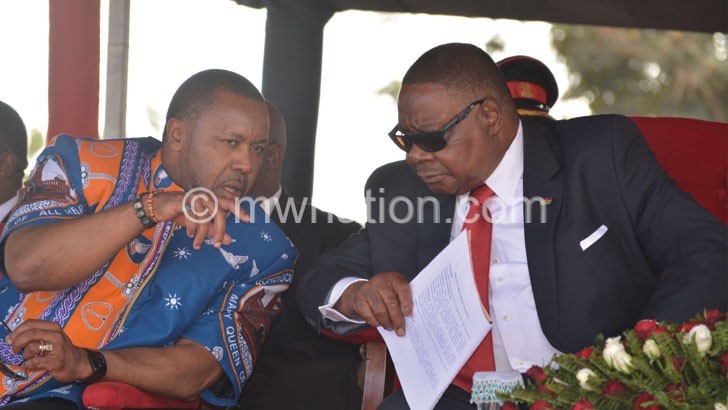Politics of rage, rivalry and intimidation
Just four years ago, President Peter Mutharika and Vice-President Saulos Chilima were like father and son, and to many, it was a journey of nurturing the son to take over the mantle in future.
Even after rumours of their fallout were slowly becoming rife in 2016 and 2017, Mutharika insisted all was fine.

“I saw him playing basketball and I was very impressed. The Vice-President is my son. Timagwirizana kwambiri [Our relationship is excellent], don’t listen to what people say,” he said, while addressing a rally at Biwi Triangle in Lilongwe on July 18 2017.
At the rally, Chilima also received the honour of asking the President to address the crowd, a rare assignment for him, having been sidelined several times on the list of those welcoming or accompanying the President on official duties. The Veep performed the assignment, leaving many believing there was no rift between them.
But the masks could not hide their true faces forever. In June 2018, Chilima dropped the bombshell. In a live local broadcast aired on Zodiak Broadcasting Station (ZBS), the Veep announced he was leaving the governing Democratic Progressive Party (DPP), marking his falling out with Mutharika.
The firm decision had it that Chilima would not compete with his boss for the governing party presidency ahead of the May 21 2019 Tripartite Elections. The Veep left his supporting guessing what his next move would be, simply by saying he would announce it “in the near future”. He, however, stressed that he would not even attend the DPP elective convention scheduled just weeks away.
At that stage, the rumour mill went in overdrive again, with some speculating Chilima would form a new party, or join one of the existing opposition parties, while others thought he would quit politics altogether.
But in July, all that came to a stop when the Veep announced that he would challenge his boss on the ballot paper as UTM party. presidential candidate. This marked the start of a cat and mouse rivalry, especially when Chilima started criticising the governing party and claiming he would reveal more.
At first, the electorate and those skeptical about how DPP is running State affairs thought this would be an opportunity to hear about government’s dirty business. But that what has manifested more since then is politics of rage, rivalry and intimidation between DPP and UTM.
However, the rage has not spared the other main parties such as United Democratic Front (UDF), Malawi Congress Party (MCP) and People’s Party (PP). And the DPP-MCP rivalry dates back to 2014 when the latter protested the 2014 Tripartite Elections results.
On the other hand, Chilima who sneaked out of the DPP’s bedroom, has become a major threat to the governing party because he knows some of its political tactics.
On political podiums, sharp tongues perpetuating violence have become the norm, with the three major parties, pulling in different directions.
UTM and MCP have succeeded in portraying the DPP regime as a corrupt government whose policies and activities are guided by nepotism and regionalism, among others. DPP, on the other hand, continues to castigate MCP as a failed party whose history is engulfed in brutality and abuse of citizens while describing UTM as a grouping of frustrated, greedy politicians. Whether they are all lies or truths is a topic for another debate.
Perhaps this is part of the reason there have been spates of violence in recent months. While political violence by the party leaders starts and ends on the political podiums, some supporters have made it physical—fighting and damaging opponents’ properties. More prominent have been violent scenes involving UTM, DPP and MCP supporters.
In August 2018, two vehicles—one belonging to UTM and another to UTM member and Mzimba North legislator Agness Nyalonje—were torched in Mangochi by unknown assailants ahead of a political rally in the lakeshore district.
UTM linked the violence to the governing party. However, this did not surprise many as a month before, the Catholic Commission for Justice (CCJP) had issued a statement against violence ahead of the 2019 polls which singled out DPP supporters as orchestrating violence against their opponents.
Several other human rights defenders, including the international community, have also issued similar warnings, and their fears are genuine.
In April this year, DPP supporters were engaged in battles with MCP followers in Milonde Ward in Mulanje ahead of by-elections in that area. The supporters, clad in DPP colours, were accused of pulling down MCP flags in the area.
The two parties later clashed in Nsanje Lalanje during the by-elections, leaving some supporters injured. During the same period, the two were also involved in violent acts in Rumphi.
The list is long, and the events may predict increased political tensions ahead of the 2019 polls.
Despite the damage that comes with political violence, the perpetrators seem to go scot-free. So far, the police have failed to act on 90 percent of political violence cases published by Nation Publications Limited (NPL) since 2014. The sample shows that out of 15 published cases, the police have acted on only one involving opposition parties. The rest, in which the governing party is implicated, remain under investigation.
With five months to the polls, the end to political violence is not within as politics of rivalry, rage and intimidation continue sto take centre-stage.
This is probably why National Peace Architecture chairperson Apostle Madalitso Mbewe has already warned that unless government and electoral stakeholders exert maximum efforts in curbing persistent incidences of political violence, the 2019 polls could be seriously compromised.





